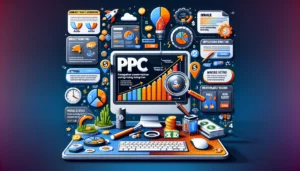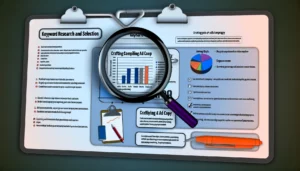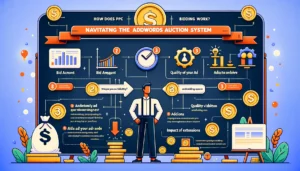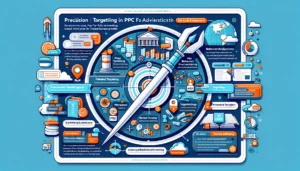How Does PPC Work? Unlocking the Secrets of Pay-Per-Click

In the fast-paced world of digital marketing, Pay-Per-Click (PPC) advertising has emerged as a cornerstone strategy for businesses aiming to amplify their online visibility and drive targeted traffic to their websites. This article demystifies PPC, outlining its workings, strategic implementation, and the benefits it can offer to businesses of all sizes. By exploring the intricacies of PPC campaigns, from keyword selection to ad copy creation and bidding strategies, we’ll provide insights into how businesses can harness the power of PPC for measurable growth and success.
Key Takeaways
- PPC is an online advertising model where advertisers pay each time their ad is clicked, offering a direct method to purchase website visits.
- A well-structured PPC campaign involves meticulous keyword research, compelling ad copy, and a strategic bidding approach to maximise ROI.
- The AdWords auction system is a competitive bidding process that determines ad placement and cost, emphasising the importance of budget control and bid strategy.
- PPC is crucial for business growth as it allows for targeted advertising, which enhances engagement and helps in reaching specific audience segments effectively.
- Advanced PPC techniques, such as utilising ad extensions and leveraging remarketing, can significantly improve ad performance and drive better campaign results.
How does PPC work? The Fundamentals of PPC Advertising
Defining Pay-Per-Click
At its core, Pay-Per-Click (PPC) is a digital advertising model where you, the advertiser, pay a fee each time your ad is clicked. This model is instrumental in driving direct traffic to websites and can be a critical component of your digital marketing strategy. Google ads PPC and Google Adwords PPC are prime examples of platforms that utilise this model, allowing you to bid on keywords and place ads in search engine results or on various websites.
When you engage with a PPC agency, you’re investing in the expertise to optimise your campaigns for the best possible outcomes. These agencies can provide services such as keyword research, ad creation, and bid management, which are essential for a successful PPC campaign. Consider the following benefits of PPC advertising:
- Immediate traffic generation
- High-level targeting options
- Measurable and trackable data
By leveraging PPC, you can ensure that your advertising dollars are spent efficiently, targeting only those who have shown interest in your product or service. It’s a strategic way to place your brand in front of potential customers who are actively searching for solutions you offer.
How does PPC work? The Role of PPC in Digital Marketing
In the digital marketing ecosystem, Pay-Per-Click (PPC) advertising is not just another option; it’s a pivotal strategy for driving traffic and conversions. PPC campaigns offer immediate visibility and provide a direct path to your website, unlike the slower climb of organic methods. With PPC, you’re able to target specific demographics, behaviours, and even times of day, ensuring that your ads reach the most relevant audience.
Consider PPC as the strategic lever you can pull to generate leads and sales when you need them most. It’s a flexible tool that adapts to your business goals and budget constraints. Here’s how PPC fits into the broader digital marketing landscape:
- Immediate Impact: Unlike SEO, PPC can yield results almost instantly.
- Budget Control: You decide how much to spend per click, per day, or per campaign.
- Targeting Precision: Tailor your ads to the audience based on location, language, and device.
- Measurable ROI: Track every click and conversion to understand your return on investment.
Embrace PPC as a cornerstone of your digital marketing strategy. It’s not just about clicks; it’s about connecting with potential customers and driving meaningful actions on your website.
Remember, while PPC can provide a significant boost, it’s not a set-and-forget solution. Regular audits and management are crucial to optimise performance and ensure that your campaigns remain competitive. A website that offers free audits for various PPC platforms can be an invaluable resource in maintaining the health of your PPC efforts.
How does PPC work? PPC vs. Organic Traffic: Understanding the Differences
When you’re weighing the merits of PPC against organic traffic, it’s essential to grasp their fundamental distinctions. PPC, or Pay-Per-Click, is akin to a sprint; it’s about buying your way to the top of search results through sponsored ads, with each click costing you money. This direct approach can yield immediate traffic and is particularly effective for targeted promotions or reaching niche audiences.
On the other hand, organic traffic is the result of SEO (Search Engine Optimisation), a marathon that requires patience and persistence. It’s about earning your spot in the search results by optimising your website’s content, structure, and user experience to be deemed relevant and credible by search engines. Unlike PPC, there’s no direct cost for clicks, but achieving a high ranking can take considerable time and effort.
Balancing the immediate impact of PPC with the sustainable growth from SEO can maximise your online presence and ROI. It’s not just about choosing one over the other; it’s about understanding how each can complement your digital marketing strategy.
Here’s a quick comparison to help you understand the key differences:
- PPC: Immediate results, direct costs per click, high control and flexibility.
- SEO: Long-term results, no direct costs for clicks, less control over how and when you appear in search results.
How does PPC work? Strategising Your PPC Campaigns
Keyword Research and Selection
At the core of your PPC strategy lies the pivotal task of keyword research. It’s not just about picking terms; it’s about understanding the intent behind the searches. Start by brainstorming a list of seed keywords that are central to your business. Then, expand this list by exploring variations and long-tail phrases that capture the nuances of your audience’s search behaviour.
Remember, the goal is to align your keywords with the specific needs and questions of your target market. This alignment is crucial for driving relevant traffic to your ads.
Utilise tools like Google’s Keyword Planner or third-party platforms such as Ahrefs and SEMrush to analyse search volume and competition. These insights will guide you in selecting keywords that are not only relevant but also offer the best potential for return on investment. Here’s a simple process to follow:
- Identify seed keywords related to your products or services.
- Use keyword research tools to find related terms and assess their viability.
- Analyse the competition for each keyword to determine your chances of ranking.
- Prioritise keywords based on relevance, search volume, and competitive advantage.
By meticulously selecting the right keywords, you’re setting the stage for a campaign that resonates with your audience and maximises your ad spend efficiency.
How does PPC work? Crafting Compelling Ad Copy
In the realm of PPC, your ad copy is your frontline soldier, engaging potential customers with precision and persuasion. Your words must resonate with the audience, addressing their needs and sparking curiosity. Keep it succinct; every word must earn its place on the page. Remember, you’re not just selling a product or service, you’re offering a solution to a problem or an enhancement to their lifestyle.
PPC ad agency experts often emphasise the importance of a clear call-to-action (CTA). This is your ad’s closing argument, urging the reader to take the next step. Whether it’s ‘Shop Now’, ‘Learn More’, or ‘Get Started’, your CTA should be direct and impossible to ignore. Here’s a simple checklist to ensure your ad copy hits the mark:
- Highlight your unique value proposition
- Address the audience’s pain points
- Use emotionally charged language
- Include a compelling CTA
Crafting ad copy that converts is both an art and a science. It requires a deep understanding of your target demographic and the ability to distill your message into a few powerful words. A/B testing is your best friend here, allowing you to hone your message to perfection.
How does PPC work? Choosing the Right Bidding Strategy
Selecting the optimal bidding strategy is pivotal to the success of your PPC campaigns. Your goal is to find a balance that maximises return on investment (ROI) while minimising costs. Consider your campaign’s objectives—whether it’s increasing brand awareness, driving sales, or generating leads—and align your bidding approach accordingly.
Manual bidding allows for granular control and is ideal for those with the time and expertise to make frequent adjustments. Automated bidding, on the other hand, leverages algorithms to optimise bids in real-time, suitable for advertisers seeking efficiency and scalability. Here’s a quick guide to help you decide:
- Manual Bidding: For advertisers who prefer hands-on control and have the capacity to monitor and adjust bids regularly.
- Automated Bidding: Best for those who value time-saving and are comfortable relying on machine learning to find optimal bid amounts.
- Hybrid Approach: Combines both manual oversight and automated suggestions, offering a balanced solution.
Remember, there’s no one-size-fits-all strategy. It’s crucial to continuously analyse performance data and adjust your bids to stay competitive in the auction landscape. Experiment with different strategies and keep a close eye on the metrics that matter most to your business.
How does PPC work? Navigating the AdWords Auction System
Understanding the Bidding Process
To truly excel in PPC, you must grasp the intricacies of the bidding process. Your bid is more than just a number; it’s a strategic tool that can determine your ad’s placement and, ultimately, its success. When you place a bid, you’re indicating the maximum amount you’re willing to pay for a click on your ad. But it’s not just about the highest bid; AdWords also considers the quality of your ad and landing page.
Remember, a higher Quality Score can lead to lower costs and better ad positions.
Here’s a simplified breakdown of the factors that influence your ad placement:
- Your bid amount
- The quality of your ad (Quality Score)
- The expected impact of extensions and other ad formats
By balancing these elements, you can enhance your ad’s visibility while controlling costs. Regularly review and adjust your bids based on the performance data and the competitive landscape. This dynamic approach will help you stay ahead in the AdWords auction system.
How does PPC work? Factors Influencing Ad Placement
When you’re navigating the complex world of PPC, understanding the factors that influence ad placement can be the difference between a successful campaign and one that falls flat. Your marketing mix, including the total cost of ownership, plays a pivotal role in where your ads are displayed. For instance, campaign types like Performance Max may broaden your online presence, yet they offer less control over specific ad placements and obscure insights into where your ads appear, potentially draining your budget on less effective display ad locations.
Google ads agencies often recommend managed placements on the Google Display Network, allowing you to adjust bids for specific positions and optimise your ad visibility. Remember, patience is key; Google suggests a waiting period of two to three weeks to accurately measure the performance of a new campaign.
The size and format of your display ads also matter. Here’s a quick list of common display ad sizes:
- Medium Rectangle (300 x 250)
- Leaderboard (728 x 90)
- Wide Skyscraper (160 x 600)
- Large Rectangle (336 x 280)
Choosing the right billing strategy is crucial. Whether it’s CPC or CTR, align it with your goals and budget for maximum impact. And don’t forget, ad extensions can significantly boost your ad’s visibility and appeal, providing more information and reasons for users to click.
Maximising Visibility While Controlling Costs
To strike the perfect balance between visibility and expenditure, you must become adept at strategic bid management. Experiment with various bidding strategies, such as manual, automated, or target-based options like CPC (Cost Per Click) or ROAS (Return on Ad Spend), to optimise your budget for the greatest impact. Regular monitoring and adjustments based on campaign performance are crucial.
Google ads audit is an invaluable tool in this process. It helps you scrutinise your account to identify areas of waste and opportunities for improvement. By conducting regular audits, you can ensure that your campaigns are as cost-effective as possible while still reaching your desired audience.
Remember, the goal is not just to gain visibility but to do so in a way that maximises your return on investment (ROI).
While campaign types like Performance Max can broaden your online presence, they offer less control over specific ad placements. It’s essential to be aware of where your ads are appearing and to adjust your strategy accordingly to avoid overspending on less relevant display ad placements.
How does PPC work? Maximising PPC for Business Growth
Targeted Advertising for Enhanced Engagement
In the realm of eCommerce PPC, the power of highly targeted advertising cannot be overstated. By honing in on specific demographics, interests, and behaviors, you can craft campaigns that resonate deeply with your audience. Precision targeting is not just about reaching a wide audience, but about connecting with the right people at the right time.
Consider the impact of ad extensions for enhanced visibility. These tools allow you to provide additional information and interactive elements that can make your ads more compelling. For instance, site link extensions can guide potential customers to specific pages of interest, increasing the likelihood of conversion.
Geo-targeting is another critical aspect of targeted advertising. By focusing your ads on specific geographic locations, you’re able to cater to local preferences and capitalise on regional trends. This level of specificity ensures that your ads are seen by individuals who are most likely to engage with your brand.
By leveraging these targeted advertising strategies, you’re not just casting a wide net—you’re using a spear to pinpoint and attract the customers who will find the most value in what you offer. This attracts more qualified traffic and increases conversion rates, which is the ultimate goal of any PPC campaign.
How does PPC work? Analysing and Optimising PPC Campaigns
To truly excel in PPC management, you must embrace the art of analysis and optimisation. Begin with a thorough PPC audit, dissecting every aspect of your campaigns to identify areas of improvement. Regularly review key performance metrics, such as click-through rates and conversion rates, to understand the health of your campaigns.
- Monitor and adjust bids to ensure you’re competitive yet cost-effective.
- Refine targeting to better align with your audience’s behaviours and preferences.
- Test different ad elements, from headlines to calls to action, for improved engagement.
Embrace the iterative process of PPC campaigns. Each adjustment is a step towards a more refined strategy that resonates with your audience and drives business growth.
Remember, PPC is not a ‘set it and forget it’ platform. It demands ongoing attention and fine-tuning. By staying proactive and responsive to data, you position your business for continuous improvement and sustained success.
Case Studies: Successful PPC Strategies
Learning from the triumphs of others can be your roadmap to PPC mastery. Take, for example, a London PPC agency that achieved a remarkable turnaround for a struggling retail brand. By overhauling their PPC strategy, focusing on high-intent keywords, and optimising ad placements, the agency not only improved the brand’s online visibility but also significantly boosted their conversion rates.
The key takeaway? A well-executed PPC campaign can transform your business’s performance.
Similarly, a PPC eCommerce agency specialising in targeted campaigns for online stores, leveraged data analytics to refine their ad targeting. The result was a substantial increase in ROI for their clients, demonstrating the power of data-driven PPC strategies.
By analysing past successes, you can distill the essence of what made these campaigns effective and apply these insights to your own PPC endeavors.
Remember, while these case studies are inspiring, your journey will be unique. Tailor your strategy to your business’s specific needs and market dynamics, and don’t hesitate to seek expert guidance to optimise your campaigns for maximum impact.
How does PPC work? Advanced PPC Techniques and Best Practices
Utilising Ad Extensions and Features
To truly elevate your PPC campaigns, you must harness the power of ad extensions. These are not mere add-ons; they are strategic tools that can significantly boost your ad’s performance. Incorporate extensions like sitelinks, callouts, and structured snippets to provide a richer user experience and improve your ad’s click-through rate (CTR).
Ad extensions serve a dual purpose: they enhance your ad’s visibility and deliver additional information that can persuade users to engage with your brand. Here’s a quick rundown of some popular extensions:
- Sitelinks: Direct users to specific pages of your website.
- Callouts: Highlight unique selling points or offers.
- Structured Snippets: Showcase a range of products or services.
- Location Extensions: Help local customers find you.
- Call Extensions: Make it easy for users to contact you.
By strategically selecting and optimising ad extensions, you can ensure that your message resonates more profoundly with your target audience.
Remember, the key to maximising the impact of these features is relevance. Align your extensions with your campaign goals and the specific needs of your audience. This alignment not only enhances user experience but also contributes to a higher quality score, which can lead to better ad positioning and lower costs.
How does PPC work? Leveraging Remarketing to Re-engage Visitors
Remarketing is a powerful tool in your PPC arsenal, allowing you to reconnect with individuals who have previously interacted with your website. It’s essential to ensure your website is equipped with the necessary tracking mechanisms to identify and segment these potential return customers effectively.
Before diving into a remarketing campaign, ask yourself if your site supports the pixels or codes required for tracking. This foundational step is crucial for a successful remarketing strategy.
Remarketing enables you to target users with high purchase intent, making it a highly efficient way to boost conversions.
Consider the benefits of remarketing, which include the ability to influence on a large scale, create specialised purpose lists, and focus on customers most likely to convert. Utilise AdWords’ preset lists or craft your own to tailor your approach.
Here are some key performance indicators (KPIs) to measure the success of your remarketing efforts:
- Conversion Rate
- Click-Through Rate (CTR)
- Cost Per Acquisition (CPA)
- Return on Ad Spend (ROAS)
By monitoring these metrics, you can refine your campaigns for better performance and higher ROI. Remember, the goal is not just to re-engage visitors but to convert their interest into tangible business growth.
A/B Testing: Refining Your PPC Approach
In the realm of PPC, A/B testing is akin to fine-tuning an instrument; it’s essential for hitting the right notes with your audience. Start by crafting two versions of your ad, each with a slight variation in copy, design, or targeting parameters. Monitor the performance metrics closely; this is where the magic of data transforms into actionable insights.
The goal is to discern which version drives more engagement and conversions. But don’t rest on your laurels once you’ve found a winner. Use this as a stepping stone to further refine and iterate, ensuring your PPC strategy evolves with your audience’s preferences and behaviours. Here’s a simple list to guide you through the process:
- Identify key elements to test (e.g., headlines, descriptions, call-to-actions)
- Set a clear objective for each test
- Run the tests simultaneously to avoid time-based biases
- Analyse the results with a focus on your predefined objectives
- Implement the more successful version
- Repeat the process to continually optimise your ads
Remember, the digital landscape is ever-changing, and so are the expectations of your audience. By committing to ongoing A/B testing, you’re not just chasing performance improvements; you’re ensuring that your brand remains relevant and compelling in a competitive market.
How does PPC work? Conclusion: Harnessing the Potential of PPC for Business Growth
As we’ve navigated through the intricacies of Pay-Per-Click advertising, it’s clear that PPC is more than just a marketing tactic; it’s a strategic tool that, when used effectively, can significantly enhance a business’s online visibility and drive targeted traffic to their website. By understanding the mechanics of PPC, from keyword research to crafting compelling ads and choosing the right bidding strategy, businesses can ensure that every click counts towards achieving their marketing objectives. Whether you’re a small business owner or a seasoned marketer, embracing the power of PPC is essential for staying competitive in the digital landscape. Remember, in the world of online advertising, PPC is not just about clicks—it’s about connecting with your audience and turning those clicks into meaningful engagements and conversions.
Frequently Asked Questions
What is PPC advertising?
Pay-Per-Click (PPC) advertising is an online marketing model where advertisers pay a fee each time their ad is clicked, essentially buying visits to their website as opposed to earning them organically.
How does PPC differ from organic traffic?
PPC is a paid advertising strategy where ads appear at the top of search results or on various platforms, with costs incurred per click. Organic traffic is earned through SEO and is not paid for.
How does the AdWords auction system work?
AdWords operates on a bidding system where advertisers bid for ad placement. The ad’s rank is influenced by the bid amount, and advertisers only pay when their ad is clicked.
Why is PPC an essential part of online advertising?
PPC is crucial in online advertising because it allows for targeted advertising, maximises ROI by reaching specific audiences, and advertisers pay only for actual clicks, enhancing engagement and cost-effectiveness.
How can PPC advertising benefit my business?
PPC advertising can benefit your business by providing targeted exposure, allowing you to reach specific demographics, and you only incur costs when potential customers show interest by clicking on your ads.
What are some best practices for creating effective PPC ads?
Effective PPC ads involve understanding your target audience, conducting thorough keyword research, crafting compelling ad copy, using eye-catching visuals, and choosing the right bidding strategy.
Author
Search Blog
Free PPC Audit
Subscribe to our Newsletter
The Voices of Our Success: Your Words, Our Pride
Don't just take our word for it. With over 100+ five-star reviews, we let our work-and our satisfied clients-speak for us.
"We have been working with PPC Geeks for around 6 months and have found Mark and the team to be very impressive. Having worked with a few companies in this and similar sectors, I rate PPC Geeks as the strongest I have come across. They have taken time to understand our business, our market and competitors and supported us to devise a strategy to generate business. I value the expertise Mark and his team provide and trust them to make the best recommendations for the long-term."
~ Just Go, Alasdair Anderson




